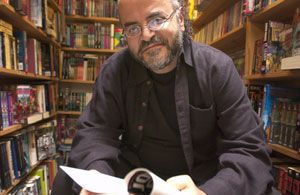The proof is in the plotting
Berkeley computer science prof, in his debut as a fiction writer, tackles Turing in a novel way
![]()
| 29 October 2003
| |  Combining inspiration with a long plane ride, Christos Papadimitriou began work on Turing (A Novel About Computation), recently published in the U.S. The Berkeley professor of computer science sees parallels between fiction writing and his academic work: “With both, everything has to fit together.” Bart Nagel photo |
One day in 1999, computer science Professor Christos Papadimitriou left a movie theater in Greece, blinded with a flash of inspiration. He had just watched a biography of one of his favorite Greek poets, Constantine P. Cavafy. The film, Papadimitriou says, was just so-so. But the idea of creating a narrative honoring the life of a great thinker appealed to the computer scientist. A book cover appeared in his mind’s eye: Papadimitriou imagined a fantastical homage to Alan Turing, the brilliant English mathematician and founder of modern computer science who took his own life in 1954.
“I wrote the first chapter on the plane ride back to Berkeley,” says Papadimitriou, who had never produced a word of fiction before.
But he kept writing, every morning from seven to nine, for two years. And now, Turing (A Novel About Computation) is a reality. Following a first publication in Greek as To Hamogelo tou Turing (translated as Turing’s Smile), the novel hit bookstore shelves in the United States this fall.
Published by MIT Press, Turing is a love story set in the near future. “The basic plot begins with boy meets girl, girl leaves boy, boy is inconsolable,” says Papadimitriou.
From there, the surreal tale truly begins to unfold. While searching for his love via the Internet, the protagonist stumbles on a computer program called Turing that can communicate in English. The man and the machine become immersed in a poetic conversation about life, love, math, death, and immortality. The program embodies one of Turing’s best-known ideas, the Turing Test, a game in which a human interrogates another human and a computer via text messages without knowing which is which. If the person could not distinguish the computer from the human, the computer would be deemed intelligent.
“In some very real sense, the program actually is Alan Turing,” Papadimitriou says.
Currently, Papadimitriou is collaborating with his friend and best-selling author Apostolos Doxiadis and several illustrators on another unusual literary project.
Logicomix is a graphic novel about the authors’ joint quest to understand the lives of the great mathematical logicians of the 20th century.
“We are trying to come to grips with the strange fact that most of them died in psychiatric hospitals,” Papadimitriou says.
Studying the triumphs and failures of the logicians who came before him informs Papadimitriou’s work in the laboratory. He applies algorithmic and complexity theory to the Internet. The broad intent is to understand how Internet growth relates to congestion and the overall health of the massively complex system.
“The Internet is the first artifact that computer scientists must study in ways similar to how scientists study the brain or cells,” he says. “The Internet is not a finished product. At the next technological fork in the road, we need to have some insight into how to improve it.”
Turing would indeed be smiling.
“Writing fiction is not unlike my work with mathematics and computers,” says Papadimitriou. “With both, everything has to fit together. The plot of a novel is very much like a mathematical proof.”
This article is adapted from the Fall 2003 issue of Forefront, the alumni magazine of the College of Engineering (www.coe.berkeley.edu/forefront).

